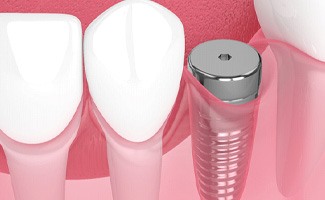Dental Implants – Waldorf, MD
Comprehensive Tooth Replacements

When you ask a dentist what the most complete option for replacing teeth is, the answer you’re most likely to get is, “dental implants.” This is the only form of tooth replacement that accounts for the part of the tooth that rests beneath the gum line. As a result, dental implants have many unique benefits that make them the next best thing to getting your original teeth back. Are you interested in restoring your smile with dental implants in Waldorf, MD? Give us a call to schedule a dental implant consultation with Dr. Akinwande at Open Smiles Dental.
Why Choose Open Smiles Dental for Dental Implants?
- Mastership in the International Congress of Oral Implantology
- Team That’s Efficient in Accommodating Your Needs
- Entire Dental Implant Process Performed In-House
What Are Dental Implants?

Dental implants are a modern tooth replacement solution that recreates the roots of the teeth along with the crowns. An implant has three parts: a biocompatible post, a restoration (such as a crown, bridge, or denture), and a metal abutment. A number of posts are inserted into the jaw so that they can fuse with the bone, and an abutment is placed on each one once the mouth has healed. Then the restoration is attached to the post(s) via the abutment(s).
The 4-Step Dental Implant Process

Dental implants are able to provide a wide array of unique benefits that you can’t achieve with other tooth replacement options. This is because the implants replace the roots of the missing teeth, allowing for additional stability. For proper maintenance and healing, dental implants require a multi-step process. While the dental implant process is different for every person, it always follows these four steps.
Initial Dental Implant Consultation

The very first step of the dental implant process is the consultation. You’ll come to our dental office so that we can examine your teeth and determine whether you’re a candidate for dental implants. This is also the point where we determine how many implant posts you need and which, if any, preliminary procedures might be needed. Once your jaw and gums are in good shape, we can move on with the rest of the treatment process.
Dental Implant Surgery

After we’ve confirmed that your mouth is ready for surgery, we’ll perform the implant placement procedure in-house. This way, you don’t need to worry about working with a specialist at a separate location. First, the area will be numbed with a local anesthetic. Then an incision is made, and each implant will be inserted into the jaw in a specific area at a carefully chosen angle. Lastly, the gums are closed, and a protective cap is placed over the post to keep it safe as it heals.
Dental Implant Osseointegration & Abutment

Over the next three to six months, your dental implants and jawbone will meld together. This process is called “osseointegration.” It is what allows the dental implants to be so stable and long-lasting. Then, you will need to undergo another minor procedure where an abutment is placed on the dental implant. Impressions are also taken at this time so your restoration can be custom crafted just for you.
Delivery of Dental Implant Restoration

Your restoration is designed at the dental lab. Once it’s ready, you will return to our practice. As the final step, we will attach the replacement teeth to your implants, leaving you with a complete smile. If everything looks and feels how it should, you will be free to depart our office with a beautiful, full grin!
Benefits of Dental Implants

Dental implants look and feel more natural than other replacement teeth due to the way they integrate with your bone tissue. You’ll be able to eat whatever you want, including steak and other foods that can be challenging for traditional denture wearers. The stimulation from the implants also restores blood flow to the area, which helps prevent bone loss in the area. And, when it comes to longevity, dental implants can last anywhere between 25 years and the rest of your life.
Who Dental Implants Can Help

Almost any adult that needs to replace at least one tooth can be considered for implant surgery provided that they:
- Are healthy enough for a surgical procedure.
- Do not currently have gum disease.
- Have a jawbone that’s strong enough to support the implant posts.
- Are able to commit to the implant process, which can take multiple visits over several months.
Once we’ve made sure that you can get implants (and have determined whether preparatory treatments like bone grafts are necessary), we can start planning the process based on the number of missing teeth.
Missing One Tooth

One implant can be placed inside your jawbone in order to replace one tooth. A crown can be attached to the post to act as your new tooth. Implant crowns are made out of tooth-colored materials such as porcelain and zirconia, which makes your smile look all the more natural after treatment.
Missing Multiple Teeth

You’ve probably heard about dental bridges that can be attached to natural teeth. Alternatively, we can also place them on two dental implants in order to replace three or more teeth at a time. This is a much more conservative approach that removes the need to make any changes to existing tooth enamel.
Missing All Teeth

Implant dentures are extremely popular among patients who need to replace entire rows of teeth. Four to eight implant posts are typically enough to hold a full denture, and we can design the prosthetic to either be removable or fixed based on your oral health needs or your own preferences.
Learn More About Implant Dentures
Understanding the Cost of Dental Implants

The cost of dental implants is something that’s different for each patient. At your initial consultation, we’ll explain the various factors that will affect how much you pay, such as any preparatory treatments needed beforehand. When comparing the price of dental implants to other tooth replacements, you should keep in mind that dental implants tend to last much longer, so they are often the better investment over the long term compared to more traditional options.
Dental Implants Post-Op Instructions

Our team has extensive training on placing dental implants, so you can expect to receive the entire treatment process right here at our office. While the procedure typically has a success rate of 95% or more, you must follow your aftercare guidelines immediately after you’ve left your appointment. Of course, you can always call us if you have any questions during your recovery. In the meantime, here are the essential dental implant post-op instructions you’ll want to follow to ensure a smooth healing process.
What to Do Directly After Dental Implant Surgery

Once you’ve undergone dental implant placement surgery, you’ll need to implement certain practices to help you heal properly while remaining as comfortable as possible. The most important part of your recovery is to make sure not to disturb the blood clot that is meant to form around the surgical site. This is crucial for allowing the implant to heal and bond to your jawbone. To avoid complications, you’ll want to avoid:
- Drinking from a straw
- Touching the implant site with your fingers or tongue
- Spitting forcefully (swallow your saliva or use tissues)
- Smoking or chewing tobacco products
Common Side Effects When Recovering from Dental Implant Placement

There are a few side effects that most patients experience after undergoing oral surgery. Knowing what to expect following your treatment can help you understand when it’s the proper time to seek help from your dentist. Here are a few common symptoms to expect and how to manage them:
- General discomfort – During your recovery, it’s natural to feel slightly sore when moving your mouth. While this should go away over time, you can help alleviate the discomfort by taking over-the-counter or prescribed pain relievers.
- Swelling – Some patients can experience swelling in the mouth that can last 72 hours to a little over a week. This can be minimized by using an ice pack on the outside of the mouth where the discomfort is felt.
- Intermittent bleeding – This can occur for several days following your treatment, but can easily be managed by applying pressure on the area with a clean gauze pad.
Your Diet After Dental Implant Surgery

As not to disturb the surgical site or blood clot, you’ll want to stick to softer foods for your meals. Some of the most popular and comfortable choices to consider include:
- Mashed potatoes
- Pureed soup
- Scrambled eggs
- Applesauce
- Yogurt
- Pudding
Post-Op Health & Oral Hygiene

Once your surgical site has healed sufficiently and you’re feeling back to normal, you’ll need to keep the area clean while your implant(s) undergoes osseointegration. This means you should brush your teeth and gums to prevent complications like bacteria and infection, which can cause your treatment to fail. Be gentle around the surgical site and try rinsing your mouth with salt water 2-3 times daily or after every meal. Don’t use mouthwash that has high concentrations of alcohol, as this can dry out your mouth or irritate your oral tissues.
What to Do After Your New Teeth Are Attached

After you’re healed and completed osseointegration, you’ll come back to our office to get your new restoration(s) attached. While you won’t need anesthetics for this portion, you might feel some sensitivity or soreness after you leave. Fortunately, this can be managed with over-the-counter pain relievers and should be short-lived. If you notice any swelling, bleeding, or other complications after getting your restoration(s) attached, notify our team right away.
Dental Implant FAQs

While dental implants provide the gold standard for tooth-replacement solutions, they can be a rather major investment. Aside from the benefits that you can be sure to enjoy from them, you’ll want to be well-informed and confident about your treatment before committing to anything. That’s why we’ve collected and responded to several of the most common questions we get about dental implants from our patients in Waldorf. Read on to learn more or reach out to our office today if you don’t see the information you’re looking for!
Will I Have to Take Off Work for Dental Implant Surgery?
The majority of people undergoing dental implant surgery only require a day or two off work so that they can get plenty of rest. Of course, if your occupation demands more physical activity, then you’ll be safer taking off three to four days instead. By performing strenuous exercise, you can end up diverting blood from the surgical site where the blood clot is supposed to form, which can delay your recovery. Since every patient is different, Dr. Akinwande will provide more specific recommendations based on your unique situation and treatment plan.
Does Getting Dental Implants Hurt?
Firstly, since your jawbone doesn’t consist of many nerve endings, you naturally shouldn’t feel as much discomfort when getting your dental implants placed. Of course, our team will make sure to completely numb your mouth with a local anesthetic before starting your procedure, that way you’ll be less likely to experience any pain. We’ll also have you under sedation so that you can feel perfectly relaxed and comfortable throughout your appointment. Once the surgery is finished, you might feel some mild soreness for a few days. This can easily be managed with a cold compress and taking your prescribed pain medications. If you notice any discomfort that worsens, notify us right away.
How Long Do Dental Implants Last?
The lifetime of your dental implants will generally be determined by your oral health and lifestyle choices. That said, with proper care, you can expect your brand-new teeth to go as far as several decades to the rest of your life! To make the most of them, be sure to brush, floss, and rinse with mouthwash every day. You’ll also want to visit us for routine checkups and cleanings every six months, that way we can remove plaque and tartar while keeping developing oral health issues at bay. Make sure to also avoid biting into anything particularly tough so that you don’t damage your implants.
Can I Get Dental Implants If I’m Diabetic?
As long as you have your diabetes under control, you’ll have a better chance of having successful dental implants. With an unchecked condition and chronic high blood sugar, you can end up having a much slower recovery, making it challenging for osseointegration to occur properly. Consult your implant dentist or primary care doctor if you’re interested in dental implants, and they’ll be glad to help you get control of your blood sugar levels ahead of time.
